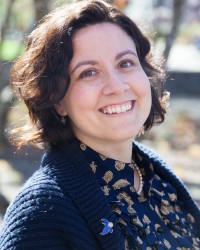Francesca Sorbara is a Ph.D. candidate in the Department of Anthropology, housed in the University of North Carolina at Chapel Hill’s College of Arts and Sciences. After living in different countries across South America, Sorbara came to Carolina to pursue a graduate degree. She is the 2022 recipient of the Coffield Family Summer Research Fellowship, which has allowed her to resume field work after COVID-19 placed a pause on her research. 
Q: Tell us a little bit about yourself.
I’m Italian, and I’m an older graduate student – in fact, I’m a mom and single parent. I grew up in Italy near Venice. I did my undergrad there, studying the history of theater. After working for a while in Milan as an educator, I went to Brazil on a scholarship in 2004. I decided to work in non-governmental organizations (NGOs), and once I mastered international development, I started working, living, and studying internationally. I worked in Ethiopia, Bolivia, and Paraguay in South America. That’s important because it led me to my work as a Ph.D. student at Chapel Hill, studying anthropology. After a decade, I felt I needed a shift. I also needed to deepen what I had been doing for years.
Q: What brought you to Carolina?
I was living in Paraguay when I applied to the Rotary Peace Fellowship and then to UNC-Chapel Hill’s Department of Anthropology. I had been living in Paraguay for four years already and was taking a break from NGOs. My son was very little, only four or five. UNC-Chapel Hill’s department specialized in Latin America, having one of the most engaged anthropologists with a very good name internationally, Arturo Escobar, whose research focuses on Latin American social movements. That motivated my decision.
Q: Tell us about your research.
I chose to work in Colombia for three main reasons. I wanted to start something new – I hadn’t lived in Colombia – but had wonderful encounters and great references with the Colombian people. Escobar is also Colombian. Colombia was undergoing a peace process and finally signed an internationally-famous peace accord in 2016, ending a 60-year civil war. So it was the perfect place to start my research and take advantage of my prior experience of a decade in Latin America.
Since 2019, I’ve researched the agricultural and farming frontier of the Colombian Amazon. I’m exploring how farmer communities are changing their livelihoods and the way of inhabiting the landscape. There is kind of an overlapping of territorial projects in these places – overlapping with the burgeoning of renewed and refreshed environmental discourses and narratives that then translate into policies.
Q: What has this summer funding allowed you to do?
I’m very grateful. Due to the COVID-19 pandemic, it has not been easy at all to go to the field. So, finally, I have the time to be there, which allows me to stay in the two communities during a very generative and transformative period. I’m talking to people who work for grassroots organizations, in addition to local government officials and local activists. I’m able to be present at events, consultations, and roundtables that are sometimes tense. That’s really where the anthropologist’s role in field work is key.
Q: What does this summer funding mean to you?
It’s an incredible privilege that, frankly, I have to say is very rare outside of the United States. You have the luxury to dedicate your time to the questions that pass through your mind. I also think we – parents who are students– are a very invisible community. There is this strict division in American culture of family and personal relations on one side and professional relations on the other. But when you’re doing field work, you go away for months. In 2017, I went away for three months when my son was six, and he stayed in the U.S. while I was in Colombia. After that experience I said, ‘No, next time I go for a long time I want to go with him.’ I’m a single mother, so I also get to travel the field with my son, which is kind of part of the education I’ve always wanted to give him. He’s already trilingual. We’re doing this adventure together.
—Kate Slate
